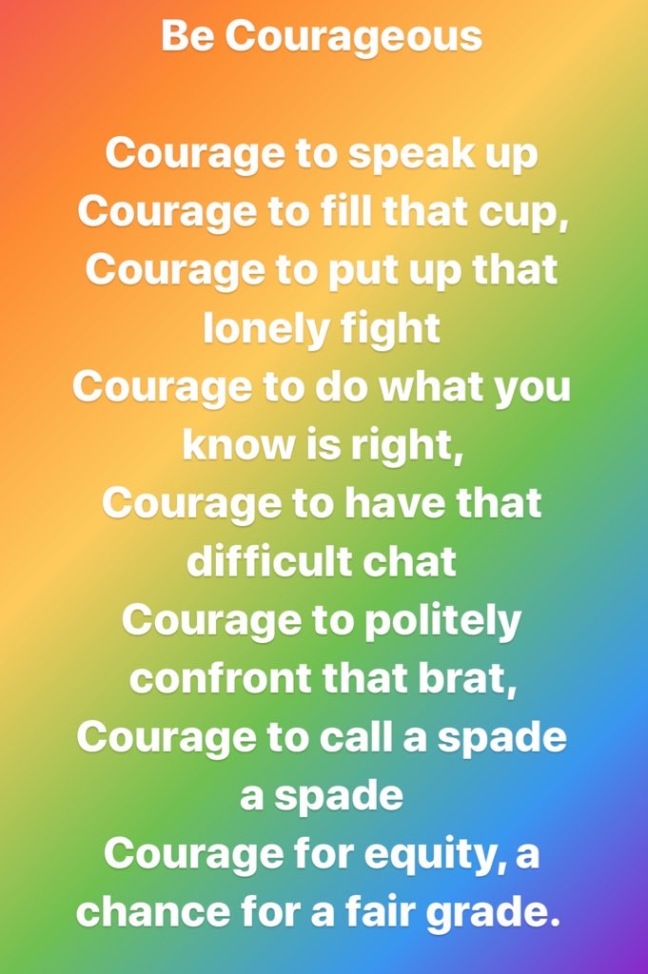I’ve recently finished reading the book, ‘Innovate Inside The box’ by George Couros as part of a book study I was involved in.

While reading the chapter, Empathetic, I came across Couros’ example of ‘Moral Muscle’, more commonly referred to as Moral Courage or Moral Integrity.
‘Being empathetic is critical to understandingdifferent perspectives and embracing every learner. One way to do this is to empower our students to speak out.’
Couros shares that often, students feel empathy but they don’t take action. It is our responsibility as educators to teach children to speak out and act with integrity regardless of the fear of social consequences. In his book, he recounts an incident which involved his daughter at the frontline. The anecdote stuck with me and made me introspect! Here is the excerpt.
‘When she was in first grade, a group of girls surrounded a boy with autism who was flapping his hands and mimicked him. She ran right over and announced, “Hey, ladies! If you want to mess with someone, you’re gonna mess with me.’
Do our students carry this dose of diva?
Do they have the courage to take action?
Do they have the conviction to stand up for what is right?
Do they believe they can change the world?
When I think about these questions in relation to our students, I believe my answer to each of these would mostly be, “Yes, absolutely”!
We offer our students a plethora of opportunities to exhibit and express their moral muscle. Our students believe that speaking out can make a change! With constant guidance and effective role modelling they are able to take action and this empathy courage-muscle is flexed when they are given the chances to stand up for what they believe in.
Students are encouraged to express their points of view through rational reasoning about issues that need to be voiced
– Through debates and classroom discussions
– They speak up in front of crowded auditoriums full of peers, parents and visitors about a range of issues from women’s rights to exploitation of the environment
– They share their thoughts and opinions both individually and in choral voices during events such as ‘ TBS RISE’, ‘Round Square conference’, ‘MUN’, ‘Anti fire cracker drive’, sing songs and raps about matters that are critical to our environment
– Engage in developing displays to build awareness and to acknowledge that all is not well with the world
– Reflect and respond to a range of perspectives about issues through texts, articles, videos, situations, dilemmas, simulations that are deliberately and intentionally brought to the forefront so that their voices are heard.
Their moral muscle is trained and flexed time and again
– Through the multiple global and environmental issues they are exposed to within the curriculum.
– When they stand up for themselves and others, when incidents of teasing or bullying take place in the bus or on the playground, they have the courage to tell the offenders to stop and have the vocabulary to speak up!
– When they get involved passionately with community service events such as ‘Lemonade for sale’ to raise money for procuring toys for an underprivileged school or when they collect blankets to provide for those struggling in the cold.
– Making a plea and persuading others to join in is one of the many ways in which we as a school enable that voice to be developed!
– When they design monthly sustainable challenges for the community and support them by campaigning and leading from the front.
Students engage in these authentic and relevant opportunities from the very beginning of their learning journey in our school and these provide our students with a purpose to flex their moral muscle.
However, responding with moral integrity in a collective is far easier. When most are doing the ‘right’ thing, it’s easy to follow suit. Isn’t it? But, how about when it comes to the individual? How about when the peers are on one side of the moral spectrum and one student feels differently? Does the ‘one’ have the moral courage to speak or act in response to when inappropriate behaviour, injustice or ill-treatment of any kind is being witnessed?
To further simplify and using very basic routine examples, how often has it happened that we have walked passed litter in the corridor, folders fallen off the shelf or bags strewn about outside locker facilities? How often have we seen a lone student correct that when no one is looking? How often would a student correct that when walking around the corridor with his / her peer group? How often has it happened that students have conveniently ignored that pencil on the floor or the books messed up on the library shelf? How often has it happened that students have promised to look after the environment and not waste paper cups in a pledge in the classroom but then conveniently pulled off 3-4 cups during lunch? How often have you seen a peer step up and tell that child that he is being wasteful? How often have you seen a child stand up and confront a group of students treating a peer inappropriately?
I read somewhere that moral courage cannot be taught, except by example.
The moral muscle needn’t always be a voice, most often it is an action. An action. A quiet action.
Understanding the actions caused by integrity starts with knowing what is important and holding fast to that idea, even when it is not convenient or to your benefit.
Stories of moral courage fill our world. Moral courage is exemplified in a book like ‘One’ where ‘One’ stands up against the nasty one who bosses over everyone. The power of one voice!
Moral courage is the face of the strong woman, Eleanor Riese in the movie ‘55 steps’, who despite her daily struggle and physical challenges, is able to become the voice of thousands of others who are suffering like her.
I could quote thousands and thousands of examples but instead I would like to leave you with questions. I would love to read your responses in the comments below.
Where and how do you give your students opportunities for being morally courageous?
How often and when do you model flexing your moral muscle?
Do your students recognise injustice?
Do your students recognise behaviour which is inappropriate or which belittles or disrespects?
Do your students have the vocabulary to combat that behaviour?
Do your students have the courage to speak out even if they are the lone voice?
How willing are you to confront a tricky situation?
When was the last time you flexed your moral courageousness?

‘If you know something is wrong and you choose to do nothing, you become complicit.’
Michael Woodford
References:
https://twitter.com/gcouros – George Couros
https://www.icas.com/professional-development/what-is-moral-courage
